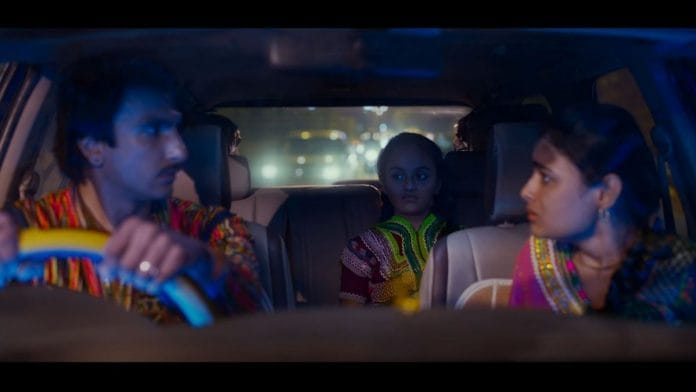Even as the Delhi High Court bench delivers a split judgment on marital rape, Jayeshbhai Jordaar throws light on other forms of violence meted out to women in families in India. Divyang Thakkar’s directorial debut acts on the premise of a social satire and uses comedy to talk about social evils. However, despite solid actors in the movie, the Ranveer Singh-starrer doesn’t quite land.
The film follows Jayesh, played by Ranveer Singh—the timid father to 9-year-old Siddhi (Jia Vaidya), and the husband of Mudra, played by Shalini Pandey, who made her fame in Arjun Reddy. Kinjal’s whole purpose in life is to provide an heir or ‘waris’. ‘Pehli galti is maaf’, so both were allowed to keep their firstborn daughter. The next 5 pregnancies were ‘miscarriages’ that took place after every child was found to be a girl. The meek father’s journey to finally ‘manning up’ in a non-toxic masculine way is the story.
The topic is definitely not new. From the 2013 dystopian film Matrubhoomi: A Nation Without Women (2003) to the critically-acclaimed TV show Na Aana Is Des Laado (2009), the subject of female infanticide has been taken up a thousand times before. So, does the film create something new? It definitely creates a non-testosterone charged hero and uses comedy. But that is about it.
Also Read: Tiger Shroff’s Heropanti 2 is enjoyable during the climax, when you know it’s about to end
Beti bachao, beti padhao
The premise is simple: a man decides to stand up against his family and neighbours to stop female infanticide and prenatal sex determination in a fictitious, testosterone-charged dystopian Gujarati village where betis are being killed off before they are born. Boman Irani plays the sarpanch, who is Jayesh’s father and Ratna Pathak Shah is his mother, who is an equal participant in their daughter-in-law’s subjugation.
Jayeshbhai Jordaar looks at everything, from sexual discrimination to absurd rules imposed on women and domestic violence. That itself becomes the film’s problem, a vast array of issues—but not examined well, and writing that’s not clever enough to tie everything together.
The film juxtaposes a village in Haryana called Laadopur with the Gujarati one to show the consequences of female infanticide. It is a ‘safe space’ for women because the men have now pledged to save every woman, albeit too late. Every male is unmarried, due to the years of sustained infanticide. It is a lesson that Jayeshbhai’s village needs to learn. The village full of wrestlers is led by Puneet Issar, and is one where people swear by ‘pleej’ and ‘soorry‘ and no violence.
Also Read: Ajay Devgn’s ‘Runway 34’ doesn’t take off. Screenplay is its worst enemy
Star of the show
Jayesh and Kinjal’s daughter, Siddhi, steals the show. Vaidya’s power-packed performance gives takkar to even Ranveer. From the emotional bits to being an avid user of the Internet, constantly asking ‘Sarla’—the Gujju version of Alexa—to show her everything from maps to YouTube videos of babies being born, she is the glue that holds Jayeshbhai Jordaar together.
Siddhi keeps her parents’ relationship tightly knit and urges her father to be ‘jordaar’ and take a stand. She is the most courageous character in the film— even commanding a bus full of Haryana wrestlers to help her father.
While many moments are almost powerful, they comprise the entire movie in a nutshell—it is an ‘almost’. Despite Ranveer Singh’s solid performance, the film does not manage to tug at your heartstrings, even through moments of dark comedy. Singh portrays Jayesh’s helplessness in front of his father and his love for his wife and daughter effortlessly. At no point does he choose violence, despite reaching a tipping point. The actor definitely manages to be ‘jordaar‘ again even if the film isn’t. However, one significant moment in the film is when the women of the village gather together every night to cry about their woes. No questions are asked and women sit in a circle and share unspoken grief.
Divyang Thakur’s Jayeshbhai Jordaar has its heart in the right place but it does not quite stay with you. In an attempt to address everything and also give a happy ending, the film loses track. The first half still works well, but post-interval, you just want your happy ending and be done with it.
It is a commendable attempt to create a hero who is sensitive, kind and does not choose violence even though he can without any consequences. One definitely needs more Jayeshbhai Jordaars as opposed to Kabir Singhs in Bollywood.
(Edited by Srinjoy Dey)






